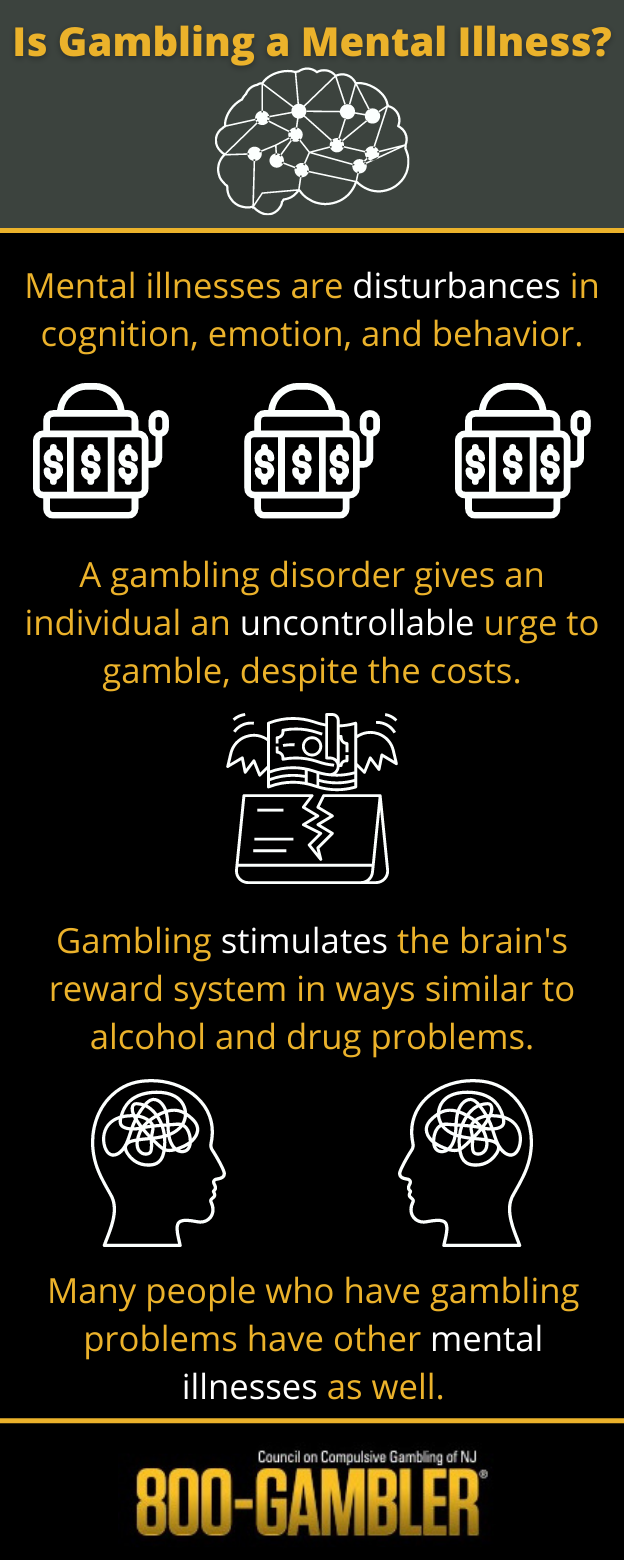Gambling too much will do more than harm you financially. Problem gambling behavior can lead to relationship issues with family and friends, decreased workplace performance, and reduced overall health. However, gambling problems may not entirely be caused by an individual’s lack of willpower or self-restraint, but another factor entirely. There are many psychological conditions that can influence a person’s mind and steer them in a negative direction, and problem gambling is among them.
But is gambling itself considered a mental health disorder? While gambling too much may not seem comparable to mental conditions like depression or anxiety disorder at first, it can be classified as a disorder. Here’s more information on gambling disorders, the connection they have with mental health issues, and how to tell if you have a gambling problem.
What Are Mental Health Disorders?
Before learning whether or not gambling itself is a mental illness, it’s important to understand what a mental health disorder is. Mental illnesses and disorders are disturbances in an individual’s cognition, behavior, and emotions that impair their functionality and make their daily lives challenging. There are a multitude of causes for mental health disorders, including stressful life experiences like abuse, neglect, and divorce, as well as a person’s brain chemistry and inherited traits from their parents.
Mental health problems are incredibly common, with millions of people having them. According to the World Health Organization (WHO), roughly one in eight people you meet will be currently living with one. Adults and children alike can develop mental health disorders, which range from depression, addiction, anxiety, and eating disorders, to name a few.
Is Problem Gambling Considered a Mental Health Disorder?

The Diagnostic and Statistical Manual of Mental Disorders first made gambling disorders diagnosable in 2013, and it is classed as an impulse-control disorder. This mental health condition is classified as repeated problem gambling behavior that gives an individual an uncontrollable urge to continue gambling even when their actions cause significant problems in their life. Many people with this disorder feel compelled to keep gambling to recover from their repeated losses, making the problem even worse.
A major reason why problem gambling behavior is considered a mental health issue is because of how it impacts the brain of the individual gambling. Participating in gambling behavior stimulates the brain’s reward system in a similar manner to substances like drugs and alcohol. Thankfully, this means that professionals can help treat those who have problems gambling too much as they would with drug problems.
Is There a Connection Between Problem Gambling Behavior and Mental Illness?
Around two-thirds of gamblers stated that their gambling was detrimental to their mental health, but were mental disorders the cause of their problem behavior? While there are numerous potential causes for gambling, such as a person’s age, personality traits, or external influences from friends and family, there are several signs that indicate mental illness is another potential source of problem gambling.
Many individuals who struggle with substance misuse disorders have also develop gambling problems. Some of the disorders and mental conditions that are common amongst those with gambling issues include:
- Anxiety Disorder
- Bipolar Disorder
- OCD
- ADHD
- And Other Mood and Personality Disorders
A percentage of problem gamblers also have reported having suicidal thoughts, while others have attempted to take their own lives. As a result, it is crucial for those with pathological gambling behaviors to seek help for the sake of their personal health and livelihood.
How to Tell if You Have a Gambling Problem
Identifying that you have a problem gambling too much is the first step to addressing the mental disorder. To learn how to tell if you have a gambling problem, here are six signs to look out for:
- Using gambling as an escape mechanism to cope with depression, guilt, or similar issues.
- Lying about gambling too much and hiding your problem behavior from those around you.
- Experiencing feelings of restlessness or irritability anytime you try to stop gambling.
- Gambling with increasingly higher amounts of money to fulfill thrills and excitement.
- Having thoughts about gambling frequently preoccupies your mind.
- Risking your personal relationships, occupation, and other important aspects of your life for the sake of fueling your gambling endeavors.
For more facts on gambling disorders, call 1-800-GAMBLER. We can help you find Gamblers Anonymous meetings that are both in-person and virtual. Support groups that offer support can help you overcome compulsive gambling behaviors and start a new chapter in your life.



